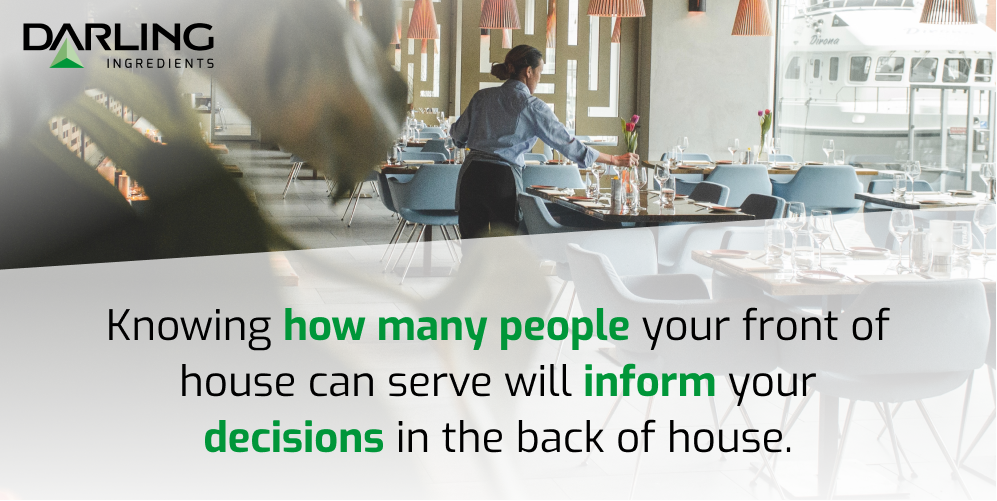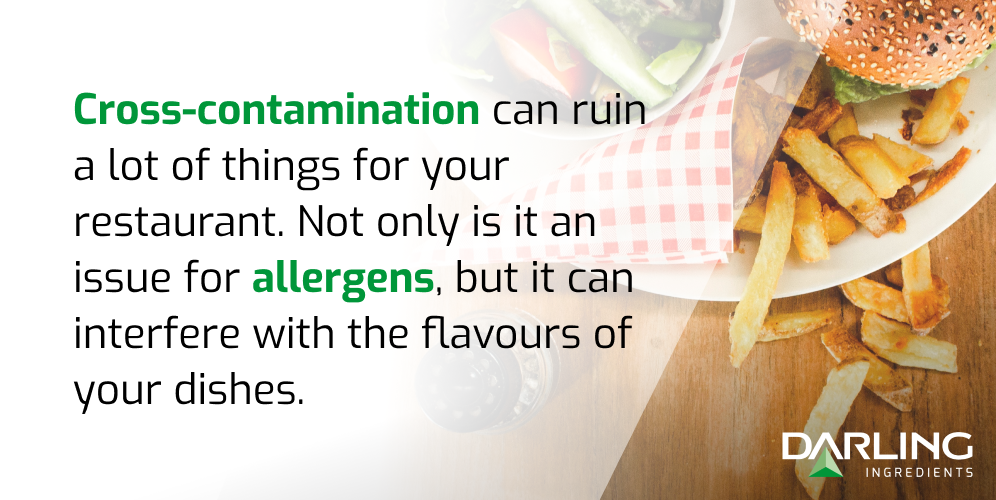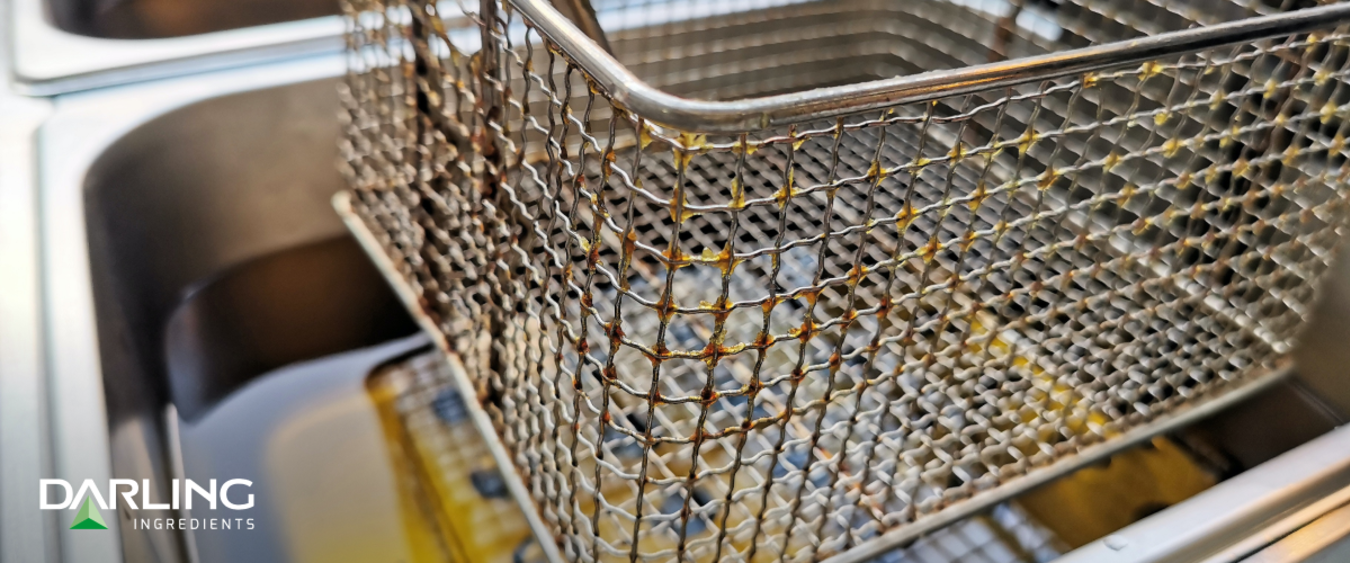How Do I Find Out What Size Fryer I Need?
The two most important things to figure out when choosing a fryer is:
- How much food you’re going to fry
- The size of your kitchen
- How many menu items will be fried
Consider the capacity of your restaurant. How many people will you be serving? Will your kitchen be feeding a cafeteria or a select few? Knowing how many people your front of house can serve will inform your decisions in the back of house.
Before you make any decisions on your equipment, nail down the menu and plan the layout of your kitchen. You’ll want to equip your kitchen with what you’ll be using and not useless or oversized equipment.

Know How Much Food You Need to Fry
Now that you have your menu and you’re aware of your restaurant’s capacity, it’s time to crunch numbers.
Commercial fryer size is measured by how much oil it can hold in pounds. This is referred to as the fryer tank capacity. Fryers can handle about 2 times the volume of food per hour as their capacity. For example a 100 pound fryer can hold up to 100 pounds of oil and cook 150-200 pounds of fries per hour.
Here’s the formula for calculating what size fryer you’ll need:
- 1.5 x (fryer size) x (number of fryers) = Pounds of fried food per hour
Think about what you learned in algebra for a second. If you know how many pounds of fried food you’ll be cooking up hourly, you’ll be able to find how many fryers you need and what size if preferred.
Let’s say you’d prefer to have 50 pound fryers and you’ll be dishing up 200 pounds of fries every hour. After you run the calculations you’ll find that you need two 50 pound fryers in order to keep up with the demand.
It might be helpful for you to mess around with the numbers to find what the best option for your kitchen is. You may end up finding that multiple smaller fryers work better in your kitchen than one large one.
Your Menu Makes a Difference in The Fryer You Choose
At this point you should have your menu set, an understanding of your restaurant’s capacity, and a good idea of what size fryer you’ll need. This is a great start, but there are a few more things to think about before you buy a commercial fryer.
Is Frying a Big Part of the Menu?
Is your restaurant going to be making fries with every meal? If so, your fryers should take up a considerable portion of your kitchen's layout.
Is your kitchen going to be making fried banana Sundays every now and then? If that’s the case, you won’t need a high volume fryer.
Kitchens that only require a fryer on occasion should consider opting for a counter space model. These are low profile models that won’t take up your precious floor space. Remember: don’t invest in something you don’t need.
Consider Allergens
Allergy-friendly restaurants will use separate surfaces, utensils, and equipment for common allergens. As you create allergy-friendly areas in your kitchen and plan out your cleaning schedules, consider your fryers as well.
It’s up to you whether or not you choose to have a separate allergen-safe fryer. It might be an easy way to accommodate more diners, or it might not be feasible in your kitchen. Either way, it’s something to consider.
How Many Different Food Items Are You Frying?
Cross-contamination can ruin a lot of things for your restaurant. Not only is it an issue for allergens, but it can interfere with the flavors of your dishes.
Oil imparts its flavor on food, and food imparts its flavor on oil. Some things might be fine together like chicken tenders and fries, but when it comes to items like fried fish, it’s probably best to keep them separate. There's something very off putting about biting into a fry that tastes like fish.
If you’ll be frying up fish, french fries, and chicken, consider using separate, samller fryers if you can. You may have local guidelines to consider when making this decision so make sure you’re following those as well.

What Happens If My Fryer is Too Small?
When your fryer is too small you’ll end up going through a lot more oil than normal. That’s because the small amount of oil being used for a large amount of food is going to get contaminated very quickly.
You’ll also have to filter your oil and clean the fryer more often. This will slow your service down a lot. You don’t want to filter your oil and then wait for the oil to heat back up in the middle of service.
Every Fryer Needs a Used Cooking Oil Disposal Solution
Choosing the right fryer for your restaurant is no easy task. Take your time before buying and consider all your options.
One final thing to think about is used cooking oil disposal. It’s not something that you can simply toss down the drain. A used cooking oil container is the best way to manage your fryer’s waste, but better than that is partnering with a company who will provide the container, and pick up your oil.
Darling Canada Installs Your UCO Systems and Collects Your UCO
Setting up service with Darling Ingredients Canada means you’ll be set up with an industry leading used cooking oil container system and collection service. We’ll install the container and set up a pick up schedule that fits the needs of your business.
Think less about your used cooking oil and put it to work by letting us collect and recycle it for you. Reach out and see how we can take used cooking oil collection off your plate.
Contact Sales
For customer service inquiries call our toll free number (800) 263-0302
By submitting this form I agree to the privacy policy including the usage of contact details to contact me for marketing purposes.
